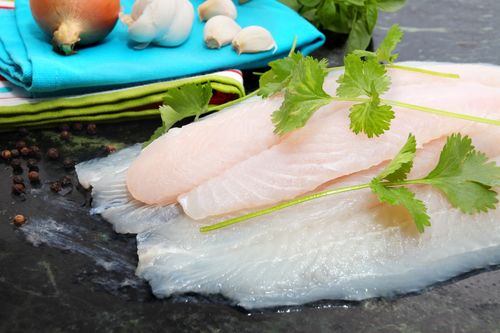Basa Fish: Health Benefits and Ways to Consume HealthifyMe Blog HealthifyMe Blog - The definitive guide to weight loss, fitness and living a healthier life.
Basa fish is a type of catfish, scientifically referred to as Pangasius Bocourti. It is also commonly called river cobbler, Vietnamese cobbler,, and swai. Native to Vietnam, Basa fish is found abundantly in the waters of the Mekong and Chao Phraya rivers. It is extensively exported worldwide.
Basa has a light pinkish flesh and a firm texture. It is a single bonefish with a broad frame and small head. It is a cheap alternative to cod or haddock due to its similar taste and texture. Western countries sell it as a boneless fish fillet. This fish is extremely popular in restaurants owing to its low price and mild smell. It is easily harvested in wild rivers and fish farms at a low price.
Nutritional Facts of Basa Fish
Fish is always a good source of protein and essential nutrients. Basa is a white fish rich in high-quality protein and is low in calories. Due to its low-calorie content, it is a perfect choice for people who wish to lose weight or are on a low-calorie diet.
1 serving (126gm) of basa fish contain:
- Calories: 158
- Protein: 22.5 grams
- Fat: 7 grams
- Saturated fat: 2 grams
- Cholesterol: 73 mg
- Carbs: 0 grams
- Sodium: 89 mg
In addition to this, Basa is also rich in Omega-3 Fatty Acids like DHA and EPA. Omega-3 fatty acids are essential to maintain good heart health and strengthen cardiac muscles. They also promote brain health.
Health Benefits of Basa Fish
Like other fish, Basa too has some good health benefits.
1. Promotes Weight Loss
Basa is high in protein and low in fat. People trying to cut down their calorie intake can opt for Basa. Since it is high in protein and low in fat and calories, it helps in getting rid of excess stored fat in the body.
2. High In Protein
Basa is packed with high-quality protein, which means it provides all the essential amino acids needed by the body. 100 grams serving of Basa fish contains 13 grams of protein. Protein is essential for our body to repair cells and make new ones. This in turn creates a foundation for tissues, muscles, and an overall fit body. Proteins are essential for growing children, pregnant women, and young adults.
3. Good for Heart Health
Basa is a rich source of Omega-3 fatty acids namely EPA and DHA, which are important for maintaining good heart health and mental health. Regular consumption of this fish is linked to reduced occurrence of heart diseases and depression.
4. Low Carbohydrates
Basa, being an animal food, is devoid of carbohydrates and is an ideal option for weight loss diets. It is a great option for lunch, as it will not make you feel lethargic or sleepy.
5. Brain Health
Eating fish improves brain health. Basa has DHA (docosahexaenoic acid) which boosts brain health. It also lowers the risk of Alzheimer’s and Parkinson’s disease.
6. Blood Pressure
Basa has low sodium content. 100 grams of a serving of Basa provides 48 mg of sodium. People suffering from high blood pressure should include Basa in their diet regularly.
7. Contributes to Longevity
Research has shown that people having higher levels of omega 3 fats in their body lived for 2.2 years longer than those with low levels of omega – 3 fatty acids. Basa fish is rich in Omega -3 fatty acids and can significantly reduce your risk for stroke, heart attack, and brain damage.
8. Provides Vital Minerals
Basa is rich in minerals like zinc and potassium. Zinc and potassium are important for boosting immunity, healing injured tissues, and regulating electrolyte balance in the body.
Health Risks of Consuming Basa Fish
Eating any type of fish comes with certain risks. Fish live in water and can take in harmful or dangerous chemicals from the water or the food they eat. Chemicals like PCBs and Mercury can develop in their bodies over time. High levels of these chemicals can cause harm to your brain and nervous system.
The ponds in which Basa fish is grown are prone to infections and its ability to survive in all types of contaminated water makes it a risky food. In addition to this, fish farmers also use various types of chemicals and drugs to get rid of microbes in the pond. Fish like Basa ingest all these harmful chemicals in their bodies and can become toxic.
According to a study, Vibrio Bacteria, a common cause of food poisoning, was detected in Basa fish exported to European countries like Germany and Poland. Always make sure that Basa is properly cleaned and cooked. According to experts, toxins in the fish are removed if it is cooked well on high heat. Look at the color of the flesh. It should not have any discoloration anywhere. Even if you are steaming or pan-frying Basa, ensure that it is not partially cooked.
Basa Fish Recipes
Basa fish can be grilled, baked, pan-fried or steamed. It blends well with Indian spices and gives a unique aromatic taste to the dish.
1. Basa Fish Curry in Coconut Milk Recipe
A flavourful Indian curry prepared with coconut milk and basa fish, a great accompaniment to rice or rotis.
Ingredients:
- Oil – 2 Tsp
- Basa Fish Fillet, Cut into pieces – 1
- Big Onion, chopped – 1
- Ginger and Garlic paste – 2 Tsp
- Big Tomato, Chopped – 1
- Coconut Milk (Thick) – 1/2 Cup
- Water – 1 Cup
- Turmeric powder – 1/4 Tsp
- Red chili powder – 1 Tsp
- Coriander powder – 1 Tsp
- Garam masala – 1/2 tsp
- Curry leaves – 2 Springs
- Salt to taste
Method:
- Heat 1 Tsp oil in a pan and add the chopped onions.
- Saute till translucent and add the ginger – garlic paste followed by the chopped tomato.
- Saute till the tomato turns soft
- Cool and grind into smooth paste by adding little water.
- Heat the remaining oil in a pan and add curry leaves followed by the ground paste.
- Fry it for a couple of minutes and add turmeric powder followed by chili and coriander powder.
- Saute till the raw smell goes off and add half a cup of water along with the required amount of salt.
- Cook it for 5 minutes on a medium flame.
- Add coconut milk along with water, if needed, and fish pieces.
- Lower the flame and cook till the fish gets cooked about 5 minutes.
- Add the garam masala.
- Simmer for a minute and serve hot.
2. Pan Fried Basa Fillets Recipe
A quick and easy recipe using Basa fish
Ingredients:
- Baby potatoes, quartered – 350g
- Extra-virgin olive oil – 1 tbsp
- Vinegar – 1/2 tbsp
- Lime zest and juice – ½
- Chilli, seeded and finely chopped – 1
- Garlic cloves, crushed – 2
- roughly chopped coriander – 3-4 tbsp
- Olive oil – 1½ tbsp
- Plain flour – 3 tbsp
- Skinless and boneless Basa fillets – 2
Preparation:
- In a medium pan of salted, boiling water, cook the potatoes for 12 minutes, or until tender.
- While the potatoes are cooking, make the salsa: In a bowl, combine the extra-virgin olive oil, vinegar, lime zest, and half lime juice.
- Add chili, half garlic, and coriander. Season and add extra lime juice as per your taste.
- Heat 1 tbsp olive oil in a large frying pan over high heat. Season the flour and use it to coat the Basa fillets
- Transfer the coated fillets to the pan.
- Fry for 30 seconds over high heat, then reduce the heat to medium-high.
- Fry for two more minutes on each side, or until golden and cooked through.
- Drain the potatoes. Return to the pan, along with the remaining olive oil and garlic.
- Lightly crush with a potato masher or a fork, and then divide between 2 plates.
- Top with the fish and drizzle over the chili and coriander salsa.
Summary
Fish is an extremely healthy option for non-vegetarians. Basa fish is loaded with high-quality protein and essential micronutrients. This fish primarily feeds on plants and can grow to a length of 4 feet. Basa fish is quite a popular choice in the international market due to its reasonable price and rich flavor. Eating Basa fish once a week is sufficient to reap all its health benefits.
In the last decade, the popularity and demand of Basa have grown significantly. Now, even India grows Basa fish known as ‘Indian Basa.’ You can eat this fish to keep your heart and brain health in check. It does not take long to cook Basa fish. You can experiment with different recipes and cooking styles using Basa. Always buy fresh Basa fish from the market and avoid using the frozen quality.
Frequently Asked Questions (FAQs)
A. Basa is high in protein and low in fat. People trying to cut down their calorie intake can opt for Basa. It prevents the accumulation of excessive fat in the body, especially around the hips, thighs, and stomach areas. Consuming Basa once or twice a week can help in weight loss.
A. Basa can be fried, steamed, or pan-fried. It blends perfectly with Indian spices and gives a rich flavor to the dish. Basa should be cooked completely. Always cook Basa on high heat to remove any toxins and impurities. You can consume Basa every week without any worries. It is packed with high-quality protein and is a rich source of omega-3 fatty acids.
A. Fish live in water and can take in harmful or dangerous chemicals from water or from the food they eat. Chemicals like PCBs and mercury can develop in their bodies over time. High levels of these chemicals can cause harm to your brain and nervous system. The ponds in which Basa fish is grown are prone to infections and its ability to survive in all types of contaminated water makes it a risky food. In addition to this, fish farmers also use various types of chemicals and drugs to get rid of microbes in the pond. Fish like Basa ingest all these harmful chemicals in their bodies and can become toxic.
According to a study, Vibrio Bacteria, a common cause of food poisoning, was detected in Basa fish exported to European countries like Germany and Poland. Ensure that Basa is properly cleaned and cooked. According to experts, toxins in the fish are removed if it is cooked well on high heat. Look at the color of the flesh. It should not have any discoloration anywhere. Even if you are steaming or pan-frying Basa, ensure that it is not partially cooked.
A. Basa fish can grow easily in any kind of water. It feeds on plants and can even survive in contaminated water. Farmers grow Basa easily and without much effort. It is cheap as it requires less maintenance and survives irrespective of the condition. Basa is now grown in different countries and is available easily in abundance which contributes to its cheap price.
A. Basa is packed with high-quality protein. 100 grams serving of Basa fish contains 13 grams of protein which is higher than that in eggs. Basa provides all the essential amino acids required by our body.
The post Basa Fish: Health Benefits and Ways to Consume appeared first on HealthifyMe Blog.
from HealthifyMe Blog https://ift.tt/3lebWj2


